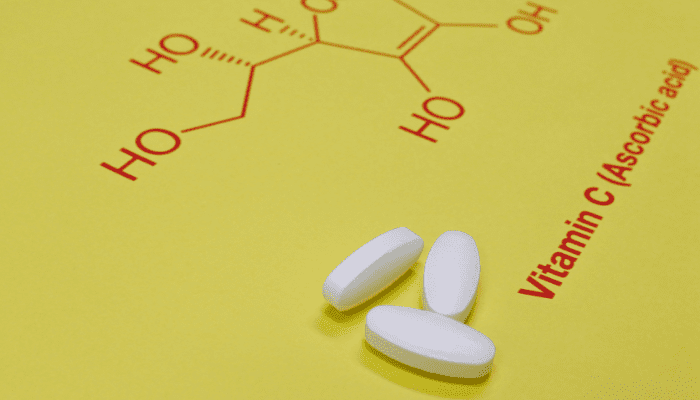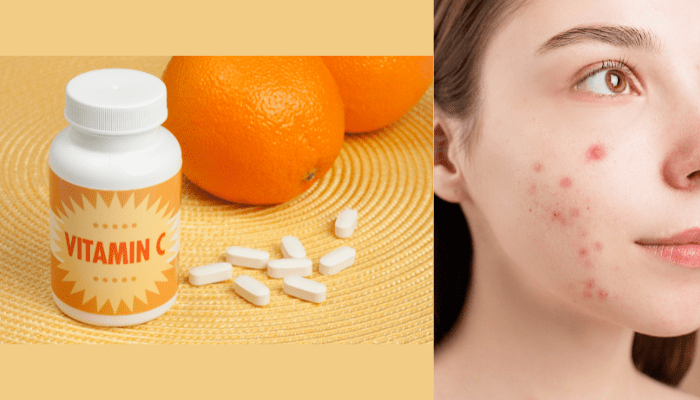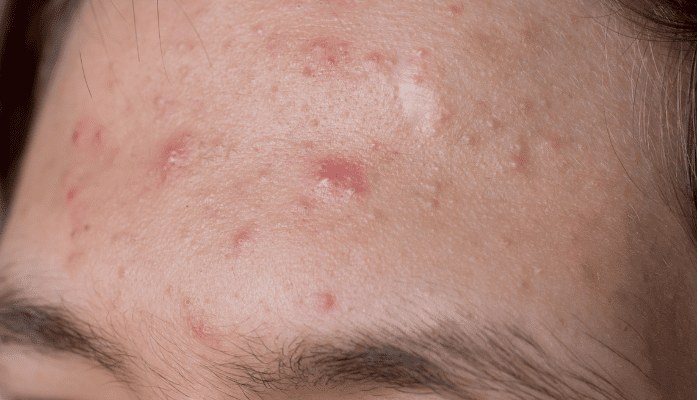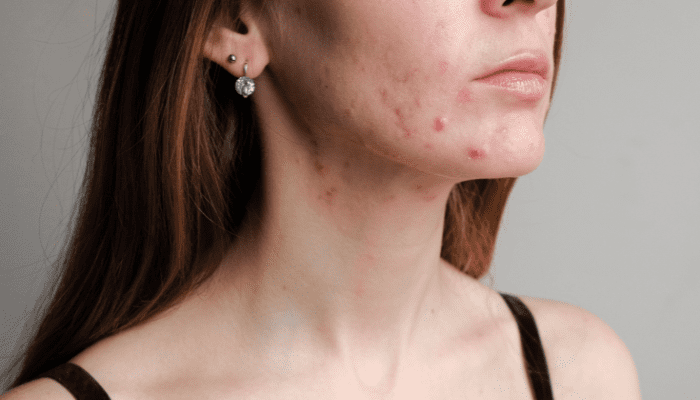If you are like most people, you probably think that acne breakout is a problem that only affects teenagers. However, the truth is that acne can affect people of all ages. If you are struggling with cystic acne, you may wonder if vitamin C can help. This blog post will discuss whether or not vitamin C can help clear up your skin.
What is Vitamin C?
Vitamin C is a water-soluble vitamin found in fruits and vegetables like oranges, strawberries, kale, and broccoli. It’s also available in supplement form. Vitamin C is important for your skin, hair, and nail health. It helps fight free radicals and can even help reduce wrinkles’ appearance.

Types of Vitamin C
Vitamin C is a water-soluble vitamin that plays an important role in many body processes. It’s also an antioxidant, which means it helps protect your cells from damage. Regarding skincare, vitamin C can help treat acne scars, brighten skin tone, and reduce inflammation.
There are different types of vitamin C, each with its benefits. Ascorbic acid is the most commonly used vitamin C in skin care products. Unfortunately, it’s also the most unstable so it can lose its potency quickly. If you’re using a product with ascorbic acid, store it in a cool, dark place to help keep it fresh.
Another type of vitamin C is L-ascorbic acid, the most potent form of Vitamin C, which is more stable than ascorbic acid but not as well-studied.
Some research suggests that L-ascorbic acid, is an active form of the vitamin, may be less effective than ascorbic acid, but more research is needed to confirm this.
The third type of vitamin C is magnesium ascorbyl phosphate (MAP). This form of vitamin C is more stable than ascorbic acid and effectively reduces acne breakouts. However, MAP can irritate some people, so test it on a small skin area before using it all over your face.

How Does Vitamin C Help Acne?
Vitamin C treats acne scars by reducing inflammation and blemishes. In addition, vitamin C helps boost the immune system, which can help fight off bacteria that can cause acne. Application of vitamin C is a powerful antioxidant that can help reduce inflammation and blemishes.
In addition, vitamin C can help boost the immune system, which can help fight off bacteria that can cause acne.
Vitamin C also helps the body produce collagen, a protein that helps keep skin condition looking firm and youthful. Collagen production declines as we age, so vitamin C can help keep skin conditions looking young and healthy.
Vitamin C is found in many foods, including citrus fruits, leafy greens, tomatoes, bell peppers, and broccoli. You can also get vitamin C from supplements. However, talking to your doctor before taking any supplements is essential, as too much vitamin C can be harmful.
If you’re looking for a way to get more vitamin C in your diet, try adding some of these foods to your meals:
Citrus fruits: oranges, grapefruits, lemons, limes
Leafy greens: kale, spinach, collards, tomatoes, bell peppers, and broccoli.

Can Vitamin C Reduce Acne Scars?
Vitamin C is a powerful antioxidant that does wonders for your oily skin. It helps to boost collagen production, which in turn helps to reduce the appearance of wrinkles and fine lines.
Application of vitamin C is also known for its brightening properties; it can help to improve your skin tone and give you a healthy-looking glow. And last but not least, vitamin C can help to fade acne scars.
How Does It Work?
When it comes to fading acne scars, vitamin C serum works by increasing collagen production and helping to repair the damage caused by inflammation. Inflammation is a big factor in the formation of acne scarring, so by reducing inflammation, vitamin C serum can help to prevent new raised scar tissue from forming.
At the same time, increasing collagen production helps to fill in existing acne scars, making them less noticeable.
The Best Ways to Use Vitamin C for Acne Scars
If you’re looking to fade your post inflammatory scars with enough vitamin C, there are a few different ways to go about it. First, you can start by using vitamin C products—look for a vitamin C serum or creams with 10-20% L-ascorbic acid, the most effective vitamin C serum for skin care purposes.
No research ties dietary vitamin C with reduced acne levels but it mayb help with general skin health.
You can also get enough vitamin C through diet; foods like oranges, strawberries, bell peppers, and kale are all excellent sources of this nutrient.

How to Use Topical Vitamin C for Acne?
Acne is a common skin condition that can be treated in various ways. One popular method is topical vitamin C. Topical vitamin C is a form of vitamin C applied directly to the skin. Vitamin C is an antioxidant that helps protect the skin from damage. It also has anti-inflammatory properties, which can help to reduce the redness and swelling of acne.
To use topical vitamin C for acne, you will need to purchase a product that contains it. You can find these products at your local drugstore or online. Be sure to read the instructions on the product before using it. Then, apply the topical vitamin C to clean dry skin. You may need to apply it multiple times per day to see results.
If you have sensitive skin types, you may want to start by using the product once per day. Then, you can increase the frequency if you don’t experience any adverse effects. However, some people may experience redness, itching, or burning when they first use topical vitamin C. If this occurs, stop using the product and consult with a dermatologist.
Side Effects of Vitamin C
1. It can cause stomach upset.
Vitamin C is acidic and can cause stomach upset, diarrhea, and nausea when taken in large doses. If you experience any of these side effects, try taking a smaller dose of vitamin C or take it with food to reduce stomach irritation.
2. It can interact with certain medications.
Vitamin C can interact with certain medications, including blood thinners, aspirin, and nonsteroidal anti-inflammatory drugs (NSAIDs). If you take any of these medications, talk to your doctor before taking vitamin C supplements.
3. It can cause kidney stones.
Kidney stones are a common side effect of taking high vitamin C supplements. If you’re prone to developing kidney stones, talk to your doctor before taking vitamin C supplements.
4. It can cause fatigue.
Fatigue is a common side effect of taking high vitamin C supplements. If you’re feeling tired after taking vitamin C, try reducing your dose or taking it earlier in the day so that it doesn’t interfere with your sleep.
5. It can cause headaches.
Headaches are a common side effect of taking high vitamin C supplements. If you experience headaches after taking vitamin C, try reducing your dose or taking it with food to reduce stomach irritation.
Best Products for Acne-prone Skin
CeraVe Foaming Facial Cleanser
This cleanser is gentle on the skin and helps to remove excess oil without stripping the skin of its natural moisture. It’s also non-comedogenic, which means it won’t clog your pores.
La Roche-Posay Effaclar Medicated Gel Cleanser
This cleanser contains salicylic acid, which helps to unclog pores and prevent breakouts. It’s also soap-free and non-drying, so that it won’t strip your skin of its natural oils.
Neutrogena Oil-Free Pink Grapefruit Facial Cleanser
This refreshing faCial cleanser contains pink grapefruit extract and vitamin C to help brighten the skin and reduce the appearance of dark spots.
In addition, it’s oil-free and non-comedogenic, so it won’t clog your pores or cause breakouts.
Benzac AC 5% Benzoyl Peroxide Gel
This gel contains 5% benzoyl peroxide, an effective acne-fighting ingredient. In addition, it helps to kill bacteria and reduce inflammation. It also has a light scent and dries quickly, so it’s perfect for use during the day.
La Roche-Posay Effaclar Duo+ Spot Treatment
This acne treatment contains 10% benzoyl peroxide to help fight acne and prevent breakouts. It also has a unique formula that helps to reduce redness and inflammation.
ZitSticka Killa Kit
This acne treatment kit has 24 patches infused with acne-fighting ingredients like salicylic acid, niacinamide, and zinc oxide. The patches help to reduce redness and inflammation while protecting the blemish from further irritation.
Mario Badescu Drying Lotion
This drying lotion is perfect for treating large pimples or blemishes overnight. Apply it before bedtime and wake up to reduced redness and inflammation in the morning.

Final Thoughts
In conclusion, Vitamin C can be a great addition to your skincare routine if you’re looking for an acne-fighting solution. It can help reduce inflammation and promote a brighter, more even skin tone. However, it’s important to note that Vitamin C should not be used as a substitute for medical treatment.
If you are experiencing severe or persistent acne vulgaris, it’s always best to consult a dermatologist. Additionally, be mindful of any potential side effects from taking Vitamin C supplements, and follow the dosage instructions carefully. Adding this natural vitamin to your skincare routine can help you achieve clearer, healthy skin in no time!
Frequently Asked Questions
Does vitamin C clear your skin?
The anti-inflammatory properties of vitamin C can help with acne through its ability to reduce sebum (oil) production within the skin. Clinical trials have shown that when applied twice daily, topical application reduced visible zones or spots on one’s face by over 50% compared to a placebo.
Does lack vitamin C cause acne?
Vitamin C deficiency can cause acne-like bumps on the arms, thighs, or buttocks. These small growths are not enough to diagnose a minimal level of Vitamin c requirement in your body’s diet, but it may indicate that you should see a doctor about any other possible health problems with insufficient intake.
What vitamins improve acne?
If you want to clear your acne, ensure that the right food and supplements are in abundance. For more information on what these items can do for those who suffer from this skin disease, as well as tips on how they should take them, consult an expert pharmacist or dermatologist.
How long does it take for vitamin C to clear the skin?
Add vitamin C to your skincare regimen, and you may see noticeable improvements in three weeks. In addition, it can help significantly fade hyperpigmentation within two months of use, so it’s a great option if hyper is starting around that time or has been bothering you lately.




